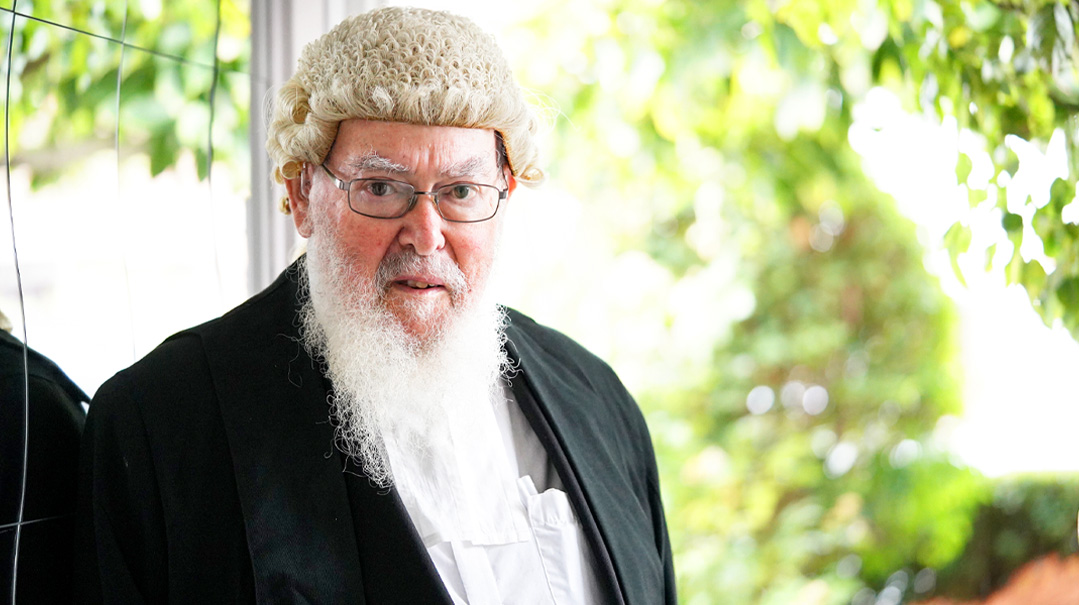Tell It to the Judge
| January 10, 2023A decade after removing the barrister’s traditional wig and robes, Judge Anthony Morris reflects on his years on the bench

Photos: Mendel Photography
Few of the litigants in the London courtroom of Judge Anthony Morris would have imagined that underneath the white wig and long cloak — the traditional British dress of UK judges holding court — was a chassidic Jew.
That’s because before entering a career in the judiciary, the rav with whom Reb Avraham Yaakov Morris consulted advised him to refrain from wearing any overtly Jewish symbols while seated on the judge’s bench.
It was never an issue for him during his 30 years in the judiciary, as he dealt primarily with civil disputes between people and companies, and legal issues within families — including divorce, maintenance, and custody of children. As a specialist judge able to deal with some of the more complicated disputes regarding children, while the more wide-reaching cases were heard in the main courtroom, many hearings were actually held in his private chamber (where someone might have noticed a framed photo of his shtreimel-clad son Reb Binyamin, a Boyaner chassid who is today menahel of the the Darchay Noam unit of London’s Menorah Grammar School).
But there was one incident in which his “secret” was exposed, and Judge Morris’s very much Jewish persona was present in the courtroom.
“In the 1980s, Britain was dealing with a severe economic crisis,” Judge Morris relates. “Part of that fallout was that many people were unable to meet their mortgage payments, which led to lawsuits by the mortgage companies to foreclose on the houses. There were times when I had to deal with 60 lawsuits like this per month — and there were two other judges in addition to me with a similar caseload. Many of these stories were heart-wrenching: families with children who were thrown out onto the street, or elderly people who lost all their savings. But legally, there wasn’t much I could do about it.
“One day, a Jewish fellow appeared before me after being faced with such a predicament. The mortgage company was demanding that an eviction notice be issued and that he immediately vacate the property. In response, the man asked for an extension of one day in which he would try to pay up the debt, which already had reached a steep 6,000 pounds. The prosecutor reacted with disbelief and objected — he claimed the defendant was just trying to buy time. ‘We deal with hundreds of cases like this,’ he said, ‘and we never encountered a debtor who was able to “arrange” 6,000 pounds within one evening.’
“I told him, ‘That’s probably because you never encountered Jewish defendants — among Jews, ‘social solidarity’ is not just an expression. There are wonderful philanthropic organizations and many good people out there. I think that in this case, we need to give him the chance until tomorrow.’
“It was not an accepted practice, but in the end the prosecutor agreed to my proposal and gave the man a 24-hour reprieve. To his shock, the next day, the man appeared with a payment confirmation for the entire sum. Among the non-Jews, he had never encountered such a thing. And so, he agreed to be more flexible with the Jewish defendants whose ability to come up with the funds, apparently, was much greater than he had anticipated.”
And one day, after trying to determine culpability in a two-car collision, Judge Morris adjourned court. As the pair of barristers for both sides of the case walked down the corridor to leave, they met the next pair of barristers coming in for the following case. The incoming barrister asked them for the name of the judge, and one of the outgoing barristers said, “I don’t know, but he looks like G-d to me.”
Oops! We could not locate your form.







